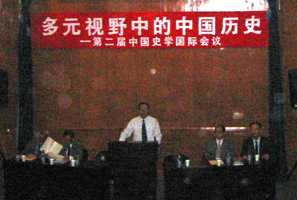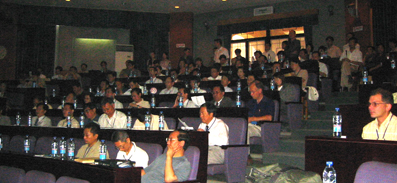
Chinese History Studies in Multi-Perspectives: The Second International Conference of Chinese History Studies, jointly hosted by Department of History of Tsinghua University, the Editorial Board of History Researches and the Historical Culture Branch of the China National Association of Oriental Culture, was held in Tsinghua University August 22 to 24, 2004. Over 130 historians from Britain, The United States of America, Japan, Korea, Singapore, and China attended the conference.
The opening ceremony was held in the Lecture Hall of the School of Science. Professor Xie Weihe, Vice-President of Tsinghua University, delivered a short speech, welcoming participants from all over the world. He made a brief introduction of the latest development of social sciences and humanities in Tsinghua, expressing hope for cooperation and communication with scholars from all over the world.

Mr. Li Xueqin, Chairman of the Evaluation Committee of the State Academic Degree Commission, professor of ancient Chinese history of the Department of History of Tsinghua, also Chairman of the Organizing Committee of this conference, made a speech on behalf of the organizing committee. Mr. Ma Min, president of the Huazhong Normal University and expert on modern Chinese history, and James Lee, famous expert on economic history and professor of Michigan University, made a speech each on behalf of the scholars. Professor Ge Jianxiong of Fudan University and Professor Liu Junwen of Peking University reported their recent researches on digitalization of historical maps and ancient literatures.
During the two and half days’ group discussion, scholars were organized into 20 panels, each focusing on a different subject such as (1)Bamboo and Silk Characters and Ancient Literature, (2)Rituals and Classics, (3)Ancient Thought and Culture, (4)Medieval Society and Culture, (5)Tang and Song Politics and Society, (6)Tang and Song Economy, (7)Ming and Qing Society and Economy, (8)Modern Thought and Culture, (9)Modern Society and Economy, (10)Frontier and Minorities, (11)Sino-foreign Communication, (12)History and Social Sciences, (12)Comparative History, (13)Reflections on Historiography, (14)New Tendencies in History Studies, and son on. Each participant was allowed a chance to present his paper and might attend any panel of discussion as he pleases, so that they might exchange their researches with other colleagues.
This conference is one of the largest and top-class international historical conferences ever held in the People’s Republic of China since 1949. Over 40 foreign participants were from such world-famous universities as Harvard, MIT, University of California, University of Michigan, London School of Politics and Economics, Tokyo University, Vasada University, among others. Chinese scholars were from such famous universities and academic institutions as Tsinghua University, Peking University, The Chinese People’s University, Beijing Normal University, Nankai University, Fudan University, Naijing University, Wuhan University, Zhongshan University, Shandong University, Shanxi University, Xiamen University, Yunnan University, the Chinese University of Hong Kong, The Chinese Academy of Social Sciences, The Shanghai Academy of Social Sciences, The Academy Sinica, among others.
After the Conference, a Forum for Young Scholars was held. Over 30 post-doctorial research fellows, doctorial candidates and post graduates presented their paper.
In the past few decades, Chinese History Studies has become an international academic field. Historians of different nationalities and cultures endeavor to understand the Chinese history from their special social and cultural background, resulting in a rich diversity in this academic area. In order to help these historians to better communicate with colleagues from other countries and areas, the first International Conference of Chinese History Studies was held in Tokyo in 2000. It was at that first conference that scholars decided that the conference be held about every fours years in Japan, the United States of America, Korea and China respectively. The next conference is to be held in 2007 in Taiwan Province, China.
Reported by Department of History

